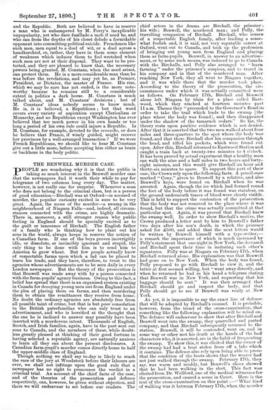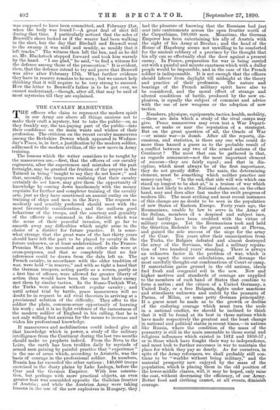BENWELL MURDER CASE.
pEOPLE are wondering why it is that the public is taking so much interest in the Benwell murder ease that the newspapers find it worth their while to pay for telegrams of two columns long every day. The matter, however, is not really one for surprise. Whenever a man who does not belong to the criminal class, but is a person of good education—Birchall was at Oxford—is accused of murder, the popular curiosity eitcited is sure to be very great. Again, the scene of the murder—a swamp in the neighbourhood of Niagara Falls—and, indeed, all circum- stances connected with the crime, are highly dramatic. There is, moreover, a still stronger reason why public feeling in England should be specially excited as to the guilt or innocence of Birchen. The English father of a family who is thinking how to plant out his sons in the world, always keeps in reserve the notion of a Canadian farm. If one of the boys proves incorrigibly idle, or dissolute, or invincibly ignorant and stupid, the only thing to be done with him is to send him to America to grow wheat. But few people actually know of respectable farms upon which a lad can be placed to learn his trade, and they have, therefore, to trust to the agencies whose advertisements are to be seen daily in every London newspaper. But the theory of the prosecution is that Benwell was made away with by a person connected with the farm-pupils' agency business. Owing to this fact, a belief has spread that there is an organised system existing in Canada for decoying young men out from England under the plea of placing them on farms, and then murdering them to obtain the remittances they receive from home. No doubt the ordinary agencies are absolutely free from all possible taint of crime, but that is but poor consolation to the British paterfamilias who can only trust to an advertisement, and who is horrified at the thought that the one he is inclined to answer may possibly have been inserted with a murderous intent. Thousands of English, Scotch, and Irish families, again, have in the past sent out sons to Canada, and the members of these, while doubt- less greatly pleased at thinking of their good fortune in having selected a reputable agency, are naturally anxious to learn all they can about the present disclosures. A Canadian farm-pupil's murder comes directly home to half the upper-middle class of England. Though nothing we shall say to-day is likely to reach the ears of the jury at Woodstock before their labours are over, we shall not infringe upon the good rule that a newspaper has no right to pronounce the verdict in a criminal trial. An account of the chief facts of the case, and of the theories of the prosecution and defence respectively, can, however, be given without objection, and these we will endeavour to set before our readers. The chief actors in the drama are Birchall, the prisoner ;. his wife ; Benwell, the murdered man ; and Pelly, the travelling companion of Birchall. Birchall, who comes of a respectable English family, after leading a some- what foolish and, it is said, not very reputable career at Oxford, went out to Canada, and took up the profession of bringing out young men from England and placing them as farm-pupils. Benwell, in answer to an advertise- ment, or by some such means, was induced to go to Canada. with the Birchalls, and Pelly also arranged to "learn. farming" under the prisoner's auspices, and to travel in his company and in that of the murdered man. After reaching New York, they all went to Niagara together,. and it was while there that the murder took place. Accordingto the theory of the prosecution, the cir- cumstances under which it was actually committed were as follows. On February 17th, Birchall and Benwell alone left Niagara by train for a place called East- wood, which they reached at fourteen minutes past 11 a.m. Thence they "proceeded to the Governor's Road in order to take the trail which leads to the swamp [the place where the body was found], and then disappeared under the shadow of the tamarack cedars." So far, the theory rests upon positive evidence which is not denied_ Afterthat it is asserted that the two men walked about four miles and three-quarters to the spot where the body wan found, and that there Birchall shot his companion through the head, and rifled his pockets, which were found cut, open. After this, Birchall returned to Eastwood Station and. caught a train back at twenty-two minutes to 4 o'clock- It has been proved by actual experiment that a healthy man. can walk the nine and a half miles in two hours and forty- eight minutes, and this would give Birchall an hour and. thirty-six minutes to spare. To support this part of their case, the Crown rely upon the following facts. A pencil-ease marked "Cony," given to Benwell by a relative, and also. Benwell's keys, were found on Birchall when he wan arrested. Again, though the ice which had formed roun& the feet of the body before it was found was stainless, on_ the ground underneath traces of blood were clearly visible.. This is held to support the contention of the prosecution. that the body was not removed to the place where it was found, but that the crime was actually committed at that particular spot. Again, it was proved that Birchall knew the swamp well. In order to show Birchall's motive, the Crown produced a letter sent by him to Benwell's father two days after his son's death, in which the prisoner asked for £500, and added that the next letters would. be written by Benwell himself with a type-writer,— a remark the importance of which is much increased by Pelly's statement that one night in New York, the deceased and Birchall spent their time in imitating each other's. signatures. Pelly was at Niagara on February 17th, when Birchall returned alone. His explanation was that Benwell - had gone on to New York. When the body was found,. Pelly proposed to go with Birchall to view it, and the latter at first seemed willing, but "went away directly, and when he returned he had in his hand a telegram stating that Benwell was in New York, and requesting that his baggage should be sent." It was then arranged that Birchall should go and inspect the body, and that Pelly should go to see if Benwell was really at New York.
As yet, it is impossible to say the exact line of defence. that will be adopted by Birchall's counsel. It is probable> however, from the trend of the cross-examination, that something like the following explanation will be relied on.. The defence will endeavour to show that after Birchall and.
Benwell went into the swamp, they quarrelled and parted company, and that Birchall subsequently returned to the station. Benwell, it will be contended, went on, and in. some way or other met his death at the hands of the bad' characters who, it is asserted, are in the habit of frequenting: the swamp. TO show this, it was elicited that the owner of the swamp had had a boat stolen from off a lake which. it contains. The defence also rely upon being able to prove that the condition of the boots shows that the wearer had not just walked through the swamp. February 17th, they say, was warm and muddy, but Benwell's shoes showed that he bad been walking in the sleet. This fact was elicited from Dr. Wellford, one of the medical witnesses for the prosecution, and caused a scene in Court. Here is the text of the cross-examination on this point :—" What kind of walking was it between February 17th, when. the marde_r was supposed to have been committed, and. February 21st, when the body was found ?—A great deal of sleet fell during that time. I particularly noticed that the soles of Benwell's shoes looked as if the wearer had been walking in the sleet, but the day that Birchall and. Benwell went to the swamp it was mild and, muddy, so muddy that it left tracks." The witness then left the box, and as he did so, Mr. Blackstock stepped forward and took him warmly by the hand. "I am glad," he said, "to find a witness for the defence among those of the prosecution." It is evident, then, that the defence intend to try and prove that Benwell was alive after February 17th. What further evidence they have in reserve remains to be seen ; but we cannot help thinking that it will require to be very strong to succeed. How the letter to Benwell's father is to be got over, we cannot understand,—though, after all, that may be said of most mysteries till they are explained.



































 Previous page
Previous page